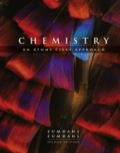
Concept explainers
Interpretation: The given organic compounds are arranged according to their increasing water solubility.
Concept introduction: Hydrocarbons are non-polar in nature, whereas water is polar. The saturated hydrocarbons are not more soluble in water and their solubility decreases on increasing the polar hydrocarbon chain. On the other hand unsaturated and
To determine: Increasing order of water solubility of the given organic compounds.
Want to see the full answer?
Check out a sample textbook solution
Chapter 21 Solutions
EBK CHEMISTRY: AN ATOMS FIRST APPROACH
- Organic compounds are always highly water soluble. True Falsearrow_forwardEXPLAIN THE INTERACTION BETWEEN THE SOLUTE AND SOLVENT IN TERMS OF THEIR STRUCTURE. 1. Why is Ethanol soluble in water? 2. Why is Acetic Acid soluble in water? 3. WHy is Ester insoluble in water? 4. Why is Ethanal soluble in water? 5. Why is Propanol soluble in water?arrow_forwardDescribe the structure, bonding, and properties of this organic functional group. Predict the solubility of this structure. Br OH A) soluble in water B) soluble in diethyl ether C) soluble in ether or water D) insoluble in all solventsarrow_forward
- CH3-CH2-O-CH2-CH2-CH2-CH2-CH3 This ether is soluble in --- and insoluble in ---, respectively. Question 28 options: water, nonpolar organic solvent nonpolar organic solvent, waterarrow_forward1. What allows some organic compounds to be soluble in water? 2. If two solutions are insoluble with each other, describe how a mixture of the two solutions would appear. 3. Explain the saying “like dissolves like” 4. What is the trend in solubility for alcohols in water as the number of carbons in the parent chain increases. Explain this trend? 5. Which of the following would be the most soluble and least soluble in water Primary amines, secondary amines, tertiary amines. Explain your reasoning. 6. Would you expect an alcohol with a 20-carbon parent chain to be soluble or insoluble in oil? Why?arrow_forward16. An atom or group of atoms that can give organic compounds distinct chemical and physical properties. 21. When a compound with the general formula R-COOH loses a proton, the product that remains is described with this term. Its general formula is R-COO- 24. A class of organic compounds in which three or more carbons form a ring structure. All of the carbon-to-carbon bonds are single bonds in this family of compounds.arrow_forward
- Among ethyl, isopropyl, tertiary butyl and n-butyl, which alcohol will first develop a pleasant odor?arrow_forwardWhich of the following best describes the solubility of aldehydes and ketones? A) They are all soluble in water and organic solvents. B) They are water soluble but not soluble in organic solvents. C) They are soluble in all organic solvents but only soluble in water for low molecular mass species. D) They are all soluble in water but only soluble in organic solvents for low molecular mass species.arrow_forwardWrite the structure of all organic products formed in the following reaction. NaBH4arrow_forward
- Classify each structure according to its functional class. H A B Darrow_forward1) To identify which contains more acid vinegar or lemon juice neutralization with sodium hydroxide can be used. Explain how. 2) The long filaments making up the thread of woven synthetic fabrics are likely polyesters. Describe the special characteristic that the alcohol and carboxylic acid must have so that they can react with each other to produce such long filaments.arrow_forwardArrange the organic compounds from most soluble in water to least soluble in water. Most soluble in water Least soluble in water Answer Bank CH;CH,CH, CH;CH,OCH, CH,CH,CH, OHarrow_forward
 Introductory Chemistry: A FoundationChemistryISBN:9781337399425Author:Steven S. Zumdahl, Donald J. DeCostePublisher:Cengage Learning
Introductory Chemistry: A FoundationChemistryISBN:9781337399425Author:Steven S. Zumdahl, Donald J. DeCostePublisher:Cengage Learning Chemistry for Today: General, Organic, and Bioche...ChemistryISBN:9781305960060Author:Spencer L. Seager, Michael R. Slabaugh, Maren S. HansenPublisher:Cengage Learning
Chemistry for Today: General, Organic, and Bioche...ChemistryISBN:9781305960060Author:Spencer L. Seager, Michael R. Slabaugh, Maren S. HansenPublisher:Cengage Learning General, Organic, and Biological ChemistryChemistryISBN:9781285853918Author:H. Stephen StokerPublisher:Cengage Learning
General, Organic, and Biological ChemistryChemistryISBN:9781285853918Author:H. Stephen StokerPublisher:Cengage Learning



